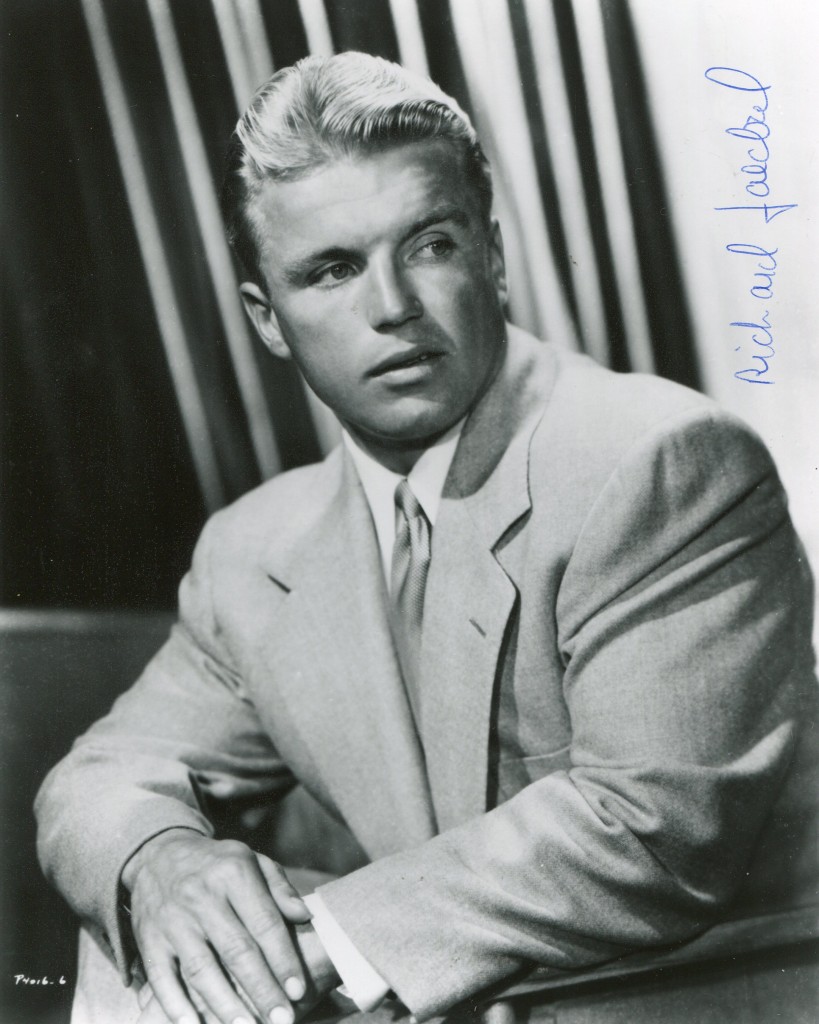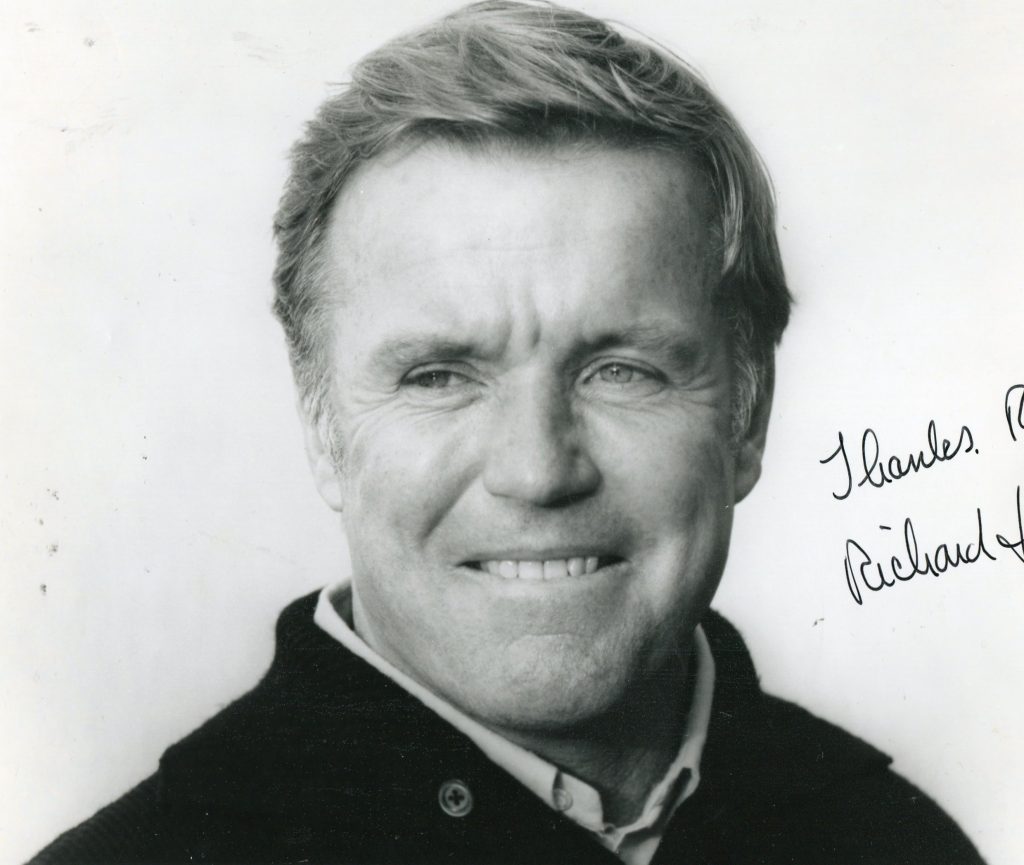

The Independent obituary in 1997.
Richard Jaeckel was born in 1926 in Long Beach, New York. His first two films were celebrated war films, “Battleground” and “Sands of Imo Jima”. Among his other films are “Come Back Little Sheba”, “The Dirty Dozen” and “Flaming Star”. He was nominated for an Academy Award for his acting in “Sometimes A Great Notion” for his beautiful performance as a member of a logging family in Oregon. Richard Jaeckel died in 1997
His obituary in “The Independent”:Blond, blue-eyed and stocky, the baby-faced Richard Jaeckel was a prolific character actor who specialised in ebullient, pugnacious youths, notably in war films and westerns.
Seemingly ageless, when he played the devious outlaw who tries to out- gun John Wayne in Chisum in 1970 he seemed little older than as the over- confident youngster who attempted to out-draw Gregory Peck in The Gunfighter 20 years earlier. An actor popular with the public and within the profession, Jaeckel was rarely out of work in a 54-year career. Nominated for an Oscar for his supporting role in Sometimes a Great Notion (1971), he more recently had a recurring role in the television series Baywatch.
Born in Long Beach, New York, in 1926, he was working in the 20th Century- Fox mailroom when, in story-book fashion, he was selected to play a featured role in the studio’s major war movie Guadalcanal Diary (1943). As an inexperienced teenage marine (nicknamed “Chicken”) who distinguishes himself in battle, Jaeckel made a strong impression in this popular adaptation of Richard Tregaskis’ book (“Richard Jaeckel scores as a downy-faced juvenile,” said Variety). He played another serviceman, this time a young pilot on an aircraft carrier, in Henry Hathaway’s fine account of events leading to the Battle of Midway, Wing and a Prayer (1944), before spending four years in the US Navy.
Returning to Hollywood in 1948, he settled into steady employment in tough roles, as a delinquent in City Across the River (1949), soldiers in Sands of Iwo Jima and Battleground (both 1949) and cowboys in Wyoming Mail and The Gunfighter (both 1950). In the latter, Henry King’s classic study of a notorious gunfighter’s futile attempt to discard his reputation and settle down, Jaeckel had one of his most memorable vignettes as the cocky youngster who sets off a tragic chain of events when, determined to prove himself faster with the gun than Johnny Ringo (Gregory Peck), he misguidedly provokes the gunfighter into a duel.
In Daniel Mann’s Come Back, Little Sheba (1952), he had a prime role as a college boy with sex on his mind who flirts agressively with the nubile Terry Moore and invokes the jealousy of her landlord (Burt Lancaster). At this time he seemed on the verge of stardom, but his stature and boyish appearance worked against him and he settled into a career of prominent but secondary roles in such action fare as Apache Ambush (1955), Cowboy (1955) and The Naked and the Dead (1958).
Two of the his finest films during this period were Robert Aldrich’s uncompromising picture of corruption and incompetence within the military, Attack! (1956), in which Jaeckel was a private under the command of a cowardly captain, and Delmer Daves’ taut western 3:10 to Yuma (1957), in which Jaeckel was an outlaw determined to rescue a captured gang-leader (Glenn Ford) before he can be transported by train to the big city and justice.
In 1967 Jaeckel played the no-nonsense sergeant who helps convert a motley bunch of military criminals into a viable fighting force in Aldrich’s violent and enormously successful The Dirty Dozen, the biggest-grossing film of the year. Jaeckel’s Sergeant Howren was one of the few characters to survive the film, and he recreated the role in the sequel made for television, The Dirty Dozen: The Next Mission (1985).
In the generally disappointing Sometimes a Great Notion (1971, released in the UK as Never Give an Inch), directed by Paul Newman and based on Ken Kesey’s novel about a family of loggers in Oregon, Jaeckel featured in one of the screen’s most memorable and harrowing death scenes. Pinned underwater by a fallen tree, he slowly drowns as Newman desperately tries to free him. Despite the starry cast of Newman, Henry Fonda and Lee Remick, it was Jaeckel whose performance was unanimously lauded as the best thing in the film and he was nominated for an Academy Award as Best Supporting Actor.
Further film roles included Pat Garrett and Billy the Kid (1973), Twilight’s Last Gleaming (1978), Starman (1985) and Delta Force 2 (1990), but Jaeckel’s later work was primarily in television. He starred in the series Frontier Circus (1961) with John Derek and Chill Wills, and as guest star on countless shows, including Bonanza, Wagon Train, Perry Mason, Gunsmoke, Have Gun Will Travel and Mission Impossible. In the mid-Eighties he had a role as Lt Quirk in the series Spenser: For Hire, and in 1991 and 1992, at last beginning to look his age, he played in Baywatch as Lt Ben Edwards, the grizzled veteran who co-ordinates rescue activity.
Richard Jaeckel, actor: born Long Beach, New York 10 October 1926; married (two sons); died Woodland Hills, California 14 June 1997.

